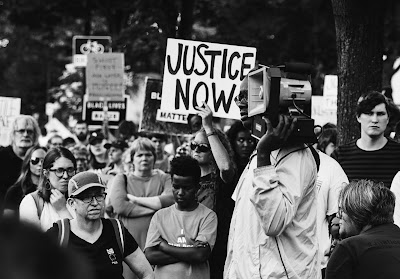Social Justice is Not Enough
Most of the large protests and
violence are over. That’s good. At this point, I don’t see a danger that the
issue of social justice and systemic racism is going away anytime soon. In my opinion, that’s good, too. We have some work to do. Anyone who reads the Hebrew Scriptures (the
Old Testament) should be fully aware that God is deeply concerned about issues
of justice and concern for the poor. The
themes are ever-present in the wisdom literature of Psalms and Proverbs. The prophets are bold and state it clearly,
“He has told you, O mortal, what is good; and what does the Lord require of you
but to do justice, and to love kindness, and to walk humbly with your God?”
(Micah 6:8).
For the most part of its history,
the Church has fulfilled that mandate.
When pandemics struck the Roman Empire, Christians courageously cared
for all the sick, even if the afflicted weren’t believers. At the time of the earliest plagues,
Christians were scorned, even persecuted to the point of death, because their
religion was illegal. It was that level
of outrageous love and care that eventually converted the majority of the
Empire to the faith. Throughout most of
European history, it was the Church that established hospitals, orphanages, and
relief for the poor. And in America, it
was Northern Evangelicals that led the fight for the eventual abolition of
slavery. The Church, when it has been
faithful to its call, has always been on the vanguard of social reform. It is true that conservative Protestants
seemed to walk away from social justice concerns in the middle of the twentieth
century to engage in theological skirmishes with their liberal cousins. But many
conservative Evangelicals have become freshly engaged in ministries of justice
and mercy in the last twenty years. This
is all good history and good news.
But it’s not enough. Jesus was not a social justice warrior. (Whoa!
Hold on! I know that may be
controversial for some people. Keep
reading!) I know the first beatitude is
“Blessed are the poor.” I know that
Jesus embraced social outcasts and healed many people with diseases. He said it’s nigh near impossible for a rich
person to enter the Kingdom. But social
justice was not the primary mission of Jesus.
When Jesus healed people, he told them to keep it quiet because he
didn’t want to build a fan base from his healing powers. Even when Peter declared that Jesus was the
Messiah, he told his disciples to keep it quiet because Jewish people imagined
their coming Messiah as a political and social justice champion. His mission
went much deeper than the surface issues of the day. Jesus did acts of mercy and justice as an
outgrowth of who he was and as a signpost of the new world he was inaugurating.
Our culture desperately needs
justice and acts of mercy. But that’s
not enough. Injustice and the cruelty of
life are symptoms of the sin-virus that infects the whole human race. Sin – our rebellion against God – is the
disease that has turned our good world upside down and made it ugly. Ultimately, Jesus came to defeat the power of
sin by offering himself as a perfect sacrifice for the whole world and rising
again on the third day. That was his
mission. And through his death and
resurrection, he offers us a new heart, a new life, a new world – out of which
will flow the justice and mercy that God has always intended. This is the gospel. This is the remedy that our world is crying
out for in this hour.




Comments
Post a Comment